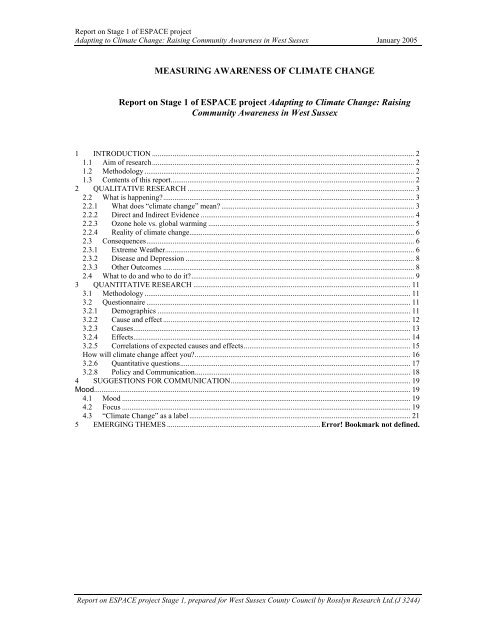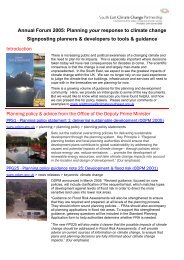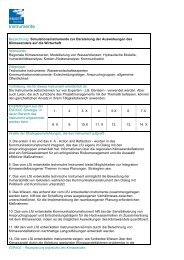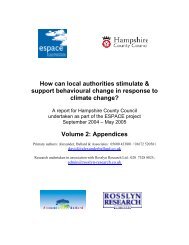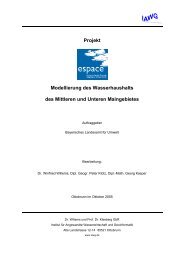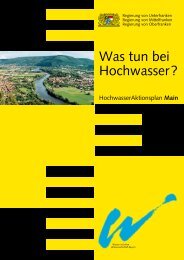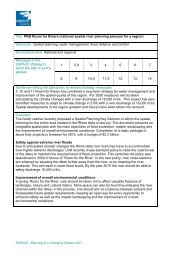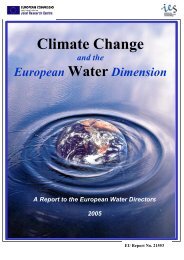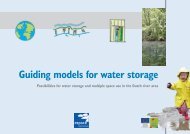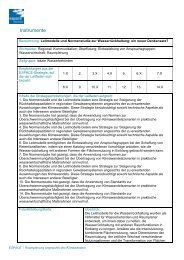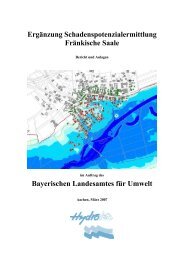MEASURING AWARENESS OF CLIMATE CHANGE ... - Espace
MEASURING AWARENESS OF CLIMATE CHANGE ... - Espace
MEASURING AWARENESS OF CLIMATE CHANGE ... - Espace
Create successful ePaper yourself
Turn your PDF publications into a flip-book with our unique Google optimized e-Paper software.
Report on Stage 1 of ESPACE project<br />
Adapting to Climate Change: Raising Community Awareness in West Sussex January 2005<br />
<strong>MEASURING</strong> <strong>AWARENESS</strong> <strong>OF</strong> <strong>CLIMATE</strong> <strong>CHANGE</strong><br />
Report on Stage 1 of ESPACE project Adapting to Climate Change: Raising<br />
Community Awareness in West Sussex<br />
1 INTRODUCTION ............................................................................................................................................ 2<br />
1.1 Aim of research............................................................................................................................................ 2<br />
1.2 Methodology ................................................................................................................................................ 2<br />
1.3 Contents of this report.................................................................................................................................. 2<br />
2 QUALITATIVE RESEARCH ......................................................................................................................... 3<br />
2.2 What is happening?...................................................................................................................................... 3<br />
2.2.1 What does “climate change” mean? ....................................................................................................... 3<br />
2.2.2 Direct and Indirect Evidence .................................................................................................................. 4<br />
2.2.3 Ozone hole vs. global warming .............................................................................................................. 5<br />
2.2.4 Reality of climate change........................................................................................................................ 6<br />
2.3 Consequences............................................................................................................................................... 6<br />
2.3.1 Extreme Weather..................................................................................................................................... 6<br />
2.3.2 Disease and Depression .......................................................................................................................... 8<br />
2.3.3 Other Outcomes ...................................................................................................................................... 8<br />
2.4 What to do and who to do it?....................................................................................................................... 9<br />
3 QUANTITATIVE RESEARCH .................................................................................................................... 11<br />
3.1 Methodology .............................................................................................................................................. 11<br />
3.2 Questionnaire ............................................................................................................................................. 11<br />
3.2.1 Demographics ....................................................................................................................................... 11<br />
3.2.2 Cause and effect .................................................................................................................................... 12<br />
3.2.3 Causes.................................................................................................................................................... 13<br />
3.2.4 Effects.................................................................................................................................................... 14<br />
3.2.5 Correlations of expected causes and effects......................................................................................... 15<br />
How will climate change affect you?................................................................................................................... 16<br />
3.2.6 Quantitative questions........................................................................................................................... 17<br />
3.2.8 Policy and Communication................................................................................................................... 18<br />
4 SUGGESTIONS FOR COMMUNICATION................................................................................................ 19<br />
Mood......................................................................................................................................................................... 19<br />
4.1 Mood .......................................................................................................................................................... 19<br />
4.2 Focus .......................................................................................................................................................... 19<br />
4.3 “Climate Change” as a label...................................................................................................................... 21<br />
5 EMERGING THEMES ..................................................................................Error! Bookmark not defined.<br />
Report on ESPACE project Stage 1, prepared for West Sussex County Council by Rosslyn Research Ltd.(J 3244)
Report on Stage 1 of ESPACE project<br />
Adapting to Climate Change: Raising Community Awareness in West Sussex January 2005<br />
1 INTRODUCTION<br />
1.1 Aim of research<br />
Rosslyn Research Ltd has been commissioned by West Sussex County Council to<br />
measure awareness of climate change amongst residents and businesses of West<br />
Sussex. The aim of the research is to provide quantifiable measures of awareness<br />
across different geographic and demographic segments of the West Sussex<br />
population, and simultaneously to provide pointers as to how climate change<br />
communications can best be planned by the Council. In other words, the aim is<br />
firstly to explore what the concept of climate change means to the various strands in<br />
the community and secondly to match this concept-set against the expert<br />
community’s interpretation and detailed expectations of climate change.<br />
1.2 Methodology<br />
In logistical terms, the backbone of the research is quantitative. Two large-scale<br />
surveys of c. 1,500 residents - mainly street interviews, with some telephone<br />
interviewing in addition - have been scheduled. The first of these has already been<br />
undertaken (in May 2004), and the second survey is planned for 2005. But the<br />
initial research phase was qualitative – a series of focus group discussions and indepth<br />
interviews. The aims of this qualitative phase were:<br />
• To provide insight into the issues surrounding the phrase “climate change” and<br />
the actual phenomenon itself<br />
• To provide guidance on the quantitative phase of the research: to suggest what<br />
should be asked and how<br />
1.3 Contents of this report<br />
This report will discuss, sequentially, the qualitative and quantitative phases of the<br />
research. Conclusions will be of two sorts:<br />
• Preliminary findings which, it is intended, will be of immediate relevance to<br />
the final project aims<br />
• Findings on the success to date of the project and recommendations for its<br />
future development.<br />
Report on ESPACE project Stage 1, prepared for West Sussex County Council by Rosslyn Research Ltd.(J 3244)
Report on Stage 1 of ESPACE project<br />
Adapting to Climate Change: Raising Community Awareness in West Sussex January 2005<br />
2 QUALITATIVE RESEARCH<br />
2.1 Methodology<br />
Three focus groups were organised in April 2004, and in-depth interviews with<br />
representatives of the business community were organised in April-May. The focus<br />
groups took place in Crawley, Midhurst and Worthing. Participants were recruited<br />
by telephone; in the recruitment process, care was taken to ensure a roughly<br />
representative spread of ages, income levels, and other demographic variables. The<br />
three locations were chosen to provide a good geographic spread, with Crawley<br />
chosen as an urban area, Midhurst as rural and Worthing as a coastal area.<br />
Group discussions followed a preplanned structure. The discussions aimed to cover<br />
such areas as:<br />
• Participants’ interpretations of the phrase “climate change”<br />
• Observed and expected changes in the local and global climate<br />
• Perceived causes and expected impacts of climate change, globally, nationally<br />
and locally<br />
• Responsibility for addressing the issue of climate change, in particular the<br />
balance between personal, political and corporate responsibility<br />
Groups had 8-10 participants, and lasted two hours.<br />
2.2 What is happening?<br />
2.2.1 What does “climate change” mean?<br />
Overall, “climate change” as a phrase out of the blue calls up two concepts again<br />
and again: “global warming” and “hole in the ozone layer”.<br />
The starting point of all the discussions was “is global warming actually<br />
happening?” Global warming is seen as the official version of events, and is treated<br />
as such. Older people and farmers tend to be much more sceptical as to whether<br />
global warming is actually happening, and as to whether it has much to do with<br />
human activity if it is happening at all. But across all ages, there is plenty of caution<br />
with regard to the idea:<br />
“Well on a historical basis I think we have seen climate change in the past<br />
when you look at the late 1700s and the very cold period we had then, the<br />
swings of weather. It is difficult to know, you can only look at pictures can’t<br />
you? But if you are looking at immediate climate change, so called global<br />
warming, there are a number of different aspects to it and you can accept that<br />
the climate may be warming. After all as I understand it we are still in the<br />
warmer stages of a cold spell generally. We are not in a warm spell in terms of<br />
the planet.”<br />
Report on ESPACE project Stage 1, prepared for West Sussex County Council by Rosslyn Research Ltd.(J 3244)
Report on Stage 1 of ESPACE project<br />
Adapting to Climate Change: Raising Community Awareness in West Sussex January 2005<br />
“I was brought up on the 11-year sunspot cycle as a farmer and it is true.<br />
There is a definite cycle of sunspots. You get a string of cold winters like we<br />
had in the war.”<br />
“I feel global warming is slightly over-hyped, and again it probably comes<br />
back to the fact that it gives the papers something to talk about.”<br />
“I think if you are running a newspaper you have got to sell it and so you have<br />
got to be sensational about it. In general terms sensation sells newspapers and<br />
that is what it is all about. You can get a newspaper story and it says it is<br />
reported that, well it could be the office boy saying I heard it from so and so.<br />
And so you can hype it up but I think in the background there probably is<br />
something there.”<br />
“Weather patterns have always gone in cycles though. I think weather records<br />
will prove that. There are cycles within cycles, there are times when things are<br />
generally warmer and times when things are generally colder and I’m not<br />
convinced in my mind that what we are seeing at the moment isn’t perhaps a<br />
warm cycle and who knows what our kids will think of how things used to be.<br />
I’m not convinced that global warming is as concrete a fact as they say it is.”<br />
2.2.2 Direct and Indirect Evidence<br />
Many participants share a carefully nuanced opinion as to whether global warming<br />
is happening. Their opinion is based on a mix of personal observation, knowledge<br />
of expert/official opinion, and judgment as to the trustworthiness of expert/official<br />
opinion:<br />
• personal observation – winters here have been warmer recently than they used<br />
to be, and to a lesser extent summers also<br />
• expert opinion – global warming is a reality<br />
• judgment on that opinion – there’s probably something in it, but “they” (i.e.<br />
government and the media) have their own agendas.<br />
Overall then, there is felt to be strong first- hand evidence of local warming and<br />
second-hand evidence of global warming. But on the other hand, there is a counterfeeling<br />
that what looks like a long-term trend may in fact be a misreading of the<br />
“noisy” data. Everyone is well aware that British weather is erratic by world and<br />
even European standards; this country’s population is perhaps not particularly<br />
receptive to the message that there are big, consistent weather trends which can<br />
explain what they are seeing outside their front doors:<br />
“The global temperature of the Earth is rising, but when you actually look at<br />
those figures it is very small fractions of a degree and the problem is that we<br />
are aware of that happening and so we interpret things that we see[here in the<br />
UK] in the light that it is down to global warming.<br />
“If I’m honest I think I don’t think about global warming much as an issue that<br />
I would really give my attention to. I just look upon the weather as being hot<br />
or cold, or seasons are not really consistent to what I was used to as a kid.”<br />
Report on ESPACE project Stage 1, prepared for West Sussex County Council by Rosslyn Research Ltd.(J 3244)
Report on Stage 1 of ESPACE project<br />
Adapting to Climate Change: Raising Community Awareness in West Sussex January 2005<br />
2.2.3 Ozone hole vs. global warming<br />
There is a stark contrast between the participants’ attitudes to the two top-of-mind<br />
concepts, “global warming” and “hole in the ozone layer”. Global warming, as<br />
discussed above, is generally seen as a tendentious reading of some quite confusing<br />
statistics. The hole in the ozone layer, by contrast, is universally taken to be a<br />
something that scientific observation has proved.<br />
The associated higher risk of skin cancer is the single most pressing personal<br />
concern for most of the participants. Concepts like “global warming” or “climate<br />
change” tend to merge in participants’ views with very general feelings that “the<br />
time is out of joint”; the hole on the ozone layer is seen as proved and ominous,<br />
whereas the more long-term threats posed e.g. by rising sea levels are harder to see<br />
as personal threats in the here-and-now.<br />
And even amongst the minority who feel personally exercised by all aspects of<br />
climate change and global warming, there is such a pervasive feeling of impotence<br />
that the overwhelming wider issues often fade away in comparison to the limited<br />
issue of the ozone hole. It’s there, it is scientifically understood, it poses certain<br />
very definite dangers to human health, and there are certain definite measures you<br />
can take to avert those dangers.<br />
Report on ESPACE project Stage 1, prepared for West Sussex County Council by Rosslyn Research Ltd.(J 3244)
Report on Stage 1 of ESPACE project<br />
Adapting to Climate Change: Raising Community Awareness in West Sussex January 2005<br />
2.2.4 Reality of climate change<br />
Participants are much readier to agree that the local climate is changing than that the<br />
global temperature is rising.<br />
The mainstream opinion is that, irrespective of the worldwide question of global<br />
warming, things are getting warmer locally and the local climate has changed in<br />
other ways. Most salient for the participants is that winters are warmer and wetter.<br />
“The winters are definitely getting warmer, because when I started this job we<br />
had at least a month where you’d need 3 pairs of socks and a pair of long<br />
johns and a pair of over trousers or you’d freeze yourself; and now I think I’ve<br />
worn long johns twice, if that.”<br />
“I think we are getting more of the rainy days; I do think we are having more<br />
grey days”<br />
Mixed in with this impression of warmer winters, there is also the feeling that the<br />
seasons are getting less distinct:<br />
“I’ve worked in the last few years with my job travelling around a bit in the<br />
car and again I used to have to wear leg warmers and fur boots and I’ve found<br />
that over the years it has changed, the winters are getting warmer. And for the<br />
last 10 years, I don’t even have my central heating on a timer, I put it on as<br />
and when I need it. Years ago if you had central heating it would go on in the<br />
winter and stay on until the spring, but I think they all mingle into each other,<br />
was it 2 weeks ago, was it a Monday we had that scorching hot day and then<br />
the next day it was freezing cold and raining as well.”<br />
“The seasons merge into each other now, there is no definite. Many years ago<br />
you would be able to see spring and then summer and then autumn and then<br />
winter, but now they are all intermingled.”<br />
“The seasons overlap quite a lot.”<br />
2.3 Consequences<br />
2.3.1 Extreme Weather<br />
There is widespread agreement that extreme weather events are becoming more<br />
common, especially strong winds and floods. Flooding is seen as the biggest single<br />
danger nationally and locally:<br />
“I think what [climate change] means at a local level, an every day level,<br />
perhaps the biggest threat to us here is increased flooding. The weather might<br />
be wetter, it might be hotter but the real things we are seeing are floods and<br />
certainly it seems that that is the biggest threat to the people of Britain and the<br />
unpredictability of it as well”<br />
Report on ESPACE project Stage 1, prepared for West Sussex County Council by Rosslyn Research Ltd.(J 3244)
Report on Stage 1 of ESPACE project<br />
Adapting to Climate Change: Raising Community Awareness in West Sussex January 2005<br />
Unsurprisingly, the Worthing group is the most concerned of all by the threat of<br />
flooding:<br />
“when I go over [to Broadlands] to think that when they had those floods that<br />
it came down that steep hill, you can’t think about that. Tthe lady that worked<br />
for me, she said she was up in her bedroom window having a conversation<br />
with a friend of hers and said “My god, the bank’s gone, the river has gone!”<br />
and within 5 minutes her friend’s house was up to the ceiling in water.”<br />
“it gets flooded and it’s got worse over the time I’ve been here”<br />
“I’ve had where their gardens are completely flooded I’ve had to wade up<br />
there to post their letters.”<br />
But concern about flooding is expressed everywhere. Flooding is particularly<br />
alarming not only in its own right, but also because it is seen as a symptom of<br />
British society’s inaction in the face of growing danger. Floods are attributed to<br />
human mismanagement of the changing climate as much as they are to the changing<br />
climate in itself. The problem is universally seen to be that drainage is getting worse<br />
while rains are getting more intense. Above all, across all groups, there is concern<br />
about the UK government’s perceived imposition of housebuilding on flood plains.<br />
But there is more general concern also about the seemingly inexorable increase in<br />
the amount of metalled surface with the consequent strain on the drainage system:<br />
“Already there are wetter winters and hot dry summers and of course a lot of<br />
concrete and hard surface spread about more and more so that you get a lot of<br />
run off and not enough drains and ditches or at least ones that contain it”<br />
“Around here the hedgerows have gone. They never flooded when I first came<br />
here.<br />
“And it floods down the main road and where does it end up? In the houses at<br />
the bottom.<br />
“We had hedges all around the back of Mill Lane and they have all gone so<br />
Mill Lane is an absolute right off as a road now because every time it rains the<br />
road surface disintegrates even more!”<br />
Report on ESPACE project Stage 1, prepared for West Sussex County Council by Rosslyn Research Ltd.(J 3244)
Report on Stage 1 of ESPACE project<br />
Adapting to Climate Change: Raising Community Awareness in West Sussex January 2005<br />
2.3.2 Disease and Depression<br />
Increased risk of skin cancer is the next highest concern – this is seen as a direct<br />
personal threat, and understandably looms large. Amongst the generally cloudy<br />
notions of climate change and its probable effects, the increased threat from the sun<br />
stands out starkly. The graphically vivid image of a hole on the ozone layer, and the<br />
fact that the phenomenon is seen as definitely proved, combine to make this a stark<br />
concern for most participants.<br />
Increase in disease is cited by many; because the seasons are disrupted and the<br />
winters are warmer, there is an expectation that there will be more “bugs” surviving<br />
and thriving.<br />
One concern, which has not as far as we know ever been considered as a policy issue,<br />
is depression caused by endless grey wet winter days. This concern was mainly<br />
raised by older participants and especially older women. They see it not only in<br />
terms of SAD but also in terms of the restrictions on being able to get around that<br />
constant rain would impose. Many other participants also voiced more general<br />
concerns that periods of heavy rain might restrict their movements; or that children<br />
would be unable to play for long periods during the winter.<br />
2.3.3 Other Outcomes<br />
Insurance premiums are a general concern, but were particularly strongly raised by<br />
local business participants in the one-on-one interviews. Insurance is so to speak<br />
part of the financial environment, and it comes naturally to see the effect of extreme<br />
weather as being a matter of a worsened financial environment.<br />
Agriculture is very widely expected to change. New crops will replace the old as the<br />
climate changes. But this, interestingly, is perceived neutrally. People are expecting<br />
these changes but in fact by no means fear them. Similarly, to a small degree,<br />
participants in the coastal group expressed some hope that warmer weather would<br />
improve the tourist trade.<br />
Report on ESPACE project Stage 1, prepared for West Sussex County Council by Rosslyn Research Ltd.(J 3244)
Report on Stage 1 of ESPACE project<br />
Adapting to Climate Change: Raising Community Awareness in West Sussex January 2005<br />
2.4 What to do and who to do it?<br />
On the grandest scale, the attitude is resigned and pessimistic. If people are directly<br />
asked, “Can anything be done to really get to grips with this problem?”, they will<br />
pretty universally answer “No”. Participants feel that they are living through a<br />
dispiriting period where everyone can see that something is wrong – even if the<br />
details are beyond them - but there are no political structures to address the problems.<br />
Blame is interchangeably laid at the doors of the USA and the unregulated<br />
capitalist/consumerist economy. Participants agree that businesses need to be<br />
regulated into lower energy consumption, but no one expects this to happen any time<br />
soon:<br />
“There is no incentive to any of these corporations to clean up their acts.<br />
Manufacturing uses energy and there are ways and means to reduce that but<br />
there aren’t any incentives for corporations to do that at the moment. There is<br />
no global environmental legislation. There is nobody speaking for the whole<br />
globe in terms of what we are doing to it. There are plenty of people with good<br />
intentions but there is no legislation to make them do anything.”<br />
In this context of the inability of political action to address the big issues, some<br />
participants are prepared to give some rueful thought to doing their bit personally.<br />
But the consensus is that it won’t make a significant difference:<br />
“All you can be responsible for is what you do; and what you can do is very<br />
little.”<br />
“It does make you wonder why you should bother doing anything. Why you<br />
should bother recycling or using your car less etc etc. If the States isn’t going<br />
to do it what difference is Britain going to make, let alone an individual?”<br />
The idea that climate change could be mitigated by voluntary self-restraint on the<br />
part of individuals is seen as unrealistic, or even as misguided. Many participants<br />
insist that if certain damaging goods or activities are out there in the marketplace,<br />
the only solution is to tackle the supply rather than the demand.<br />
“With advertising the way it is, it is very difficult for you not to want what is<br />
put in front of you.”<br />
“if you can’t get these things available on the shelves then you can’t have them.<br />
If we didn’t have cigarettes to smoke, you couldn't get them off the shelf,<br />
children wouldn’t be able to pick up the habit.”<br />
Ultimately, participants don’t see how the logic of a consumerist system can allow<br />
for concerted action to address the root causes of climate change. At the same time,<br />
though, there is a widespread feeling that governments can help populations to<br />
tackle those causes of climate change that lie within their own personal activities and<br />
orientations. Inasmuch as participants can suggest any way forward, they see<br />
government- or media-led social change as the answer.<br />
“we have only just recently got the red boxes for recycling the paper stuff…<br />
Report on ESPACE project Stage 1, prepared for West Sussex County Council by Rosslyn Research Ltd.(J 3244)
Report on Stage 1 of ESPACE project<br />
Adapting to Climate Change: Raising Community Awareness in West Sussex January 2005<br />
“That has been amazing…<br />
“It said in the paper, I think 15000 trees have been saved just from recycling<br />
the paper”<br />
“You have to make it so it is not acceptable to do anything else. For example<br />
a few years ago nobody took any notice of the speed limits and now people do.<br />
Because it has become socially unacceptable to go screaming through a 30<br />
mile limit at 50 miles an hour. And you know there is peer pressure and all<br />
sorts of pressure that comes onto people to conform. I think it may take a bit<br />
longer but somehow that is the way it has to come”<br />
It is highly significant, for the overall purposes of the project, to note that almost no<br />
connection at all is made between recycling and addressing climate change.<br />
Recycling is seen by respondents as a paradigm of successful communal action. But<br />
they don’t know of any connection between this and the issue of climate change.<br />
Between the deeply-concerned on the one hand and the sceptics on the other, the<br />
mainstream attitude seems to be that:<br />
• The first hints of what will one day be a severe problem can already be seen in<br />
the here and now<br />
• “Everyone” – the world, the developed world, the population of the UK – will<br />
start pulling together when the crisis comes<br />
• Market forces will force people into less irresponsible behaviour, in particular<br />
they will use less energy when it costs much more<br />
• For the moment the rulers of the world aren’t doing anything about it, so why<br />
should I?<br />
Report on ESPACE project Stage 1, prepared for West Sussex County Council by Rosslyn Research Ltd.(J 3244)
Report on Stage 1 of ESPACE project<br />
Adapting to Climate Change: Raising Community Awareness in West Sussex January 2005<br />
3 QUANTITATIVE RESEARCH<br />
3.1 Methodology<br />
Part 2 of Stage I consisted of 1,350 personal interviews with residents and<br />
businesses in West Sussex and 200 residents of Hampshire. In addition, 200<br />
interviews were undertaken with residents of Belgium (RLZZZ region), covering<br />
four different residential areas. Data from the RLZZZ survey will be discussed<br />
where appropriate.<br />
West Sussex was divided into 4 areas [A 23 corridor/Rural/ Coastal East and Costal<br />
West]<br />
• 1,050 interviews with residents with quotas by age and gender<br />
• 440 urban/ 370 small town/ 330 rural<br />
• 210 interviews with businesses with quotas by 6 industry sectors.<br />
• 100 interviews with the farming community<br />
• “Control’ sample of 200 residents in Hampshire<br />
3.2 Questionnaire<br />
In essence there were four types of question asked:<br />
1. demographic questions<br />
2. cause and effect questions, to establish what constitutes climate change in the<br />
opinion of respondents, and whether they think climate change is occurring<br />
3. quantitative questions, to find out how close the match is between people’s<br />
expectation of temperature and rainfall changes and the best estimates of experts<br />
4. policy and communication questions – who should lead and who should<br />
communicate on the issue?, is enough being done?, etc.<br />
3.2.1 Demographics<br />
The demographic questions form the basis for analysis of the answers. Respondents<br />
were categorised according to:<br />
• Type (farming, business, residential, non-West Sussex)<br />
• Gender<br />
• Age<br />
• Household size and number of children<br />
• Home ownership<br />
• Type of residence<br />
• Location of residence (urban/rural, coastal/valley/plain/hills)<br />
• Socio-economic grade<br />
Report on ESPACE project Stage 1, prepared for West Sussex County Council by Rosslyn Research Ltd.(J 3244)
Report on Stage 1 of ESPACE project<br />
Adapting to Climate Change: Raising Community Awareness in West Sussex January 2005<br />
3.2.2 Cause and effect<br />
In the focus groups, with people discussing the issue at much greater length and in<br />
more detail than most of them would normally do, it appeared to us that climate<br />
change as a phenomenon was seen as very blurred around the edges in terms of<br />
cause and effect. This of course is very much in line with expert opinion. At the<br />
core, as it seemed to us, is the idea that greenhouse gas emissions are causing the<br />
earth’s temperature to rise. But around this core, participants express all sorts of<br />
wider ideas of cause and effect: pollution in general, human greed, overpopulation,<br />
the world going out of joint.<br />
So one thing we wanted to test in the quantitative survey was the extent to which<br />
these various themes are seen as central or peripheral. In particular, since many<br />
participants in the groups had explicitly said that it’s hard to distinguish cause and<br />
effect in this area, we wanted to explore that issue quantitatively.<br />
This was tested by presenting number of possible causes and effects of climate<br />
change to respondents. These were rated by respondents “out of 10”:<br />
• For causes, ‘1’ indicated that “it has no impact at all on climate change” and<br />
‘10’ that “it is a major cause of climate change”.<br />
• For effects, ‘1’ indicated that “it won’t happen or doesn’t matter” and ‘10’ that<br />
“it is or will be a major effect of climate change”.<br />
• Therefore, the higher the rating, the more important is the factor as a perceived<br />
cause of effect of climate change.<br />
The possible causal factors which respondents were asked to rate were:<br />
• Hole in the ozone layer<br />
• Too much building/ construction on flood plains<br />
• Deforestation in the UK<br />
• Pollution by industry<br />
• Cutting down of rain forest in South America and Asia<br />
• Pollution caused by cars<br />
• Greenhouse gas emissions/greenhouse effect<br />
• Lack of recycling of household waste<br />
• Overpopulation<br />
These factors were chosen to represent a mixed bag of generally-agreed causes,<br />
wider contributory factors, and factors which might better be see as exacerbating<br />
factors rather than causes of climate change.<br />
Report on ESPACE project Stage 1, prepared for West Sussex County Council by Rosslyn Research Ltd.(J 3244)
Report on Stage 1 of ESPACE project<br />
Adapting to Climate Change: Raising Community Awareness in West Sussex January 2005<br />
3.2.3 Causes<br />
The possible effects were:<br />
• Hotter summers<br />
• Wetter winters<br />
• New diseases, e.g. malaria<br />
• Droughts<br />
• Floods<br />
• Changes in planning laws<br />
• Changes in agriculture<br />
• Wetter summers<br />
• Warmer winters<br />
The evidence from the large-scale survey is in fact that people in general have a<br />
reasonably accurate picture of the underlying causes and major expected and<br />
observed effects. Deforestation and greenhouse gas emissions are identified as<br />
major causal factors.<br />
In the details, though, some systematic inaccuracies can be seen. In particular,<br />
“pollution caused by the car” is rated as more significant than “greenhouse gas<br />
emissions”. This suggests that the more general, and highly emotive, concept of<br />
pollution looms larger as a factor in the minds of the general West Sussex<br />
population than it does for the expert community. Similarly, the ratings for “cutting<br />
down of rainforest in South America and Asia” and for “hole in the ozone layer” are<br />
higher amongst the general public than they would be amongst the expert<br />
community. These are both highly pictorial and emotive factors, and it is<br />
noteworthy though not surprising that they loom larger as causes of climate change<br />
amongst the general public.<br />
The other major discrepancy between public and experts is in their estimation of the<br />
relative impacts of industry and transport. Overall, respondents rate “the car” (and<br />
by extension, perhaps, all transport based on fossil fuels) as a more significant causal<br />
factor than industry. This is not correct – not yet, at any rate, though the relative<br />
contribution of transport is growing year-on-year. Younger people are particularly<br />
likely to overestimate the causal impact of cars, and so are owners of 2 or more cars!<br />
The business subgroup – especially those from larger organisations - are particularly<br />
likely to underestimate the impact of industry.<br />
Amongst West Sussex residents, those in social grades A/B come closest to the<br />
expert consensus. These respondents also make the clearest distinctions between<br />
major causes of climate change and attendant or contributory factors.<br />
The Belgian respondents also come closer to the expert consensus. They still<br />
overrate the hole in the ozone layer (even more than the UK respondents); but their<br />
ranking of industry, transport and deforestation in that order is in line with the expert<br />
consensus. Interestingly, there is a huge gap for the UK respondents between<br />
rainforest deforestation (rated as the most important factor) and deforestation in the<br />
Report on ESPACE project Stage 1, prepared for West Sussex County Council by Rosslyn Research Ltd.(J 3244)
Report on Stage 1 of ESPACE project<br />
Adapting to Climate Change: Raising Community Awareness in West Sussex January 2005<br />
3.2.4 Effects<br />
UK (rated as least important); whereas in Belgium local and global deforestation are<br />
rated pretty equally as factors causing climate change.<br />
Across the board, RLZZZ respondents tended to rate the suggested factors at a much<br />
lower level. This may reasonably be taken as a measure of overall concern about the<br />
issue (notoriously it is more reliable to measure levels of concern like this than to<br />
ask outright “how concerned are you?”). So, overall, we can say that the RLZZZ<br />
group is better informed about the causes of climate change, but less concerned<br />
about the issue.<br />
Within the UK survey, there are similar discrepancies in overall scoring:<br />
• Men rate factors higher than women<br />
• Farmers rate factors much lower than other groups<br />
• West Sussex residents rate factors slightly above average<br />
• Businesses rate factors lower, but above farmers<br />
• The control group of Hampshire (interviewed in urban areas) rate the factors<br />
highest of all and often by a substantial margin.<br />
Also, there are interesting and statistically significant differences on particular<br />
factors. For example, the under-19 age group scores most factors lower than other<br />
age groups; but for deforestation in the UK and pollution caused by cars, the<br />
situation is reversed. Overall it appears that the 31-50 age group is most concerned.<br />
Urban residents generally are more concerned than rural or small-town residents<br />
(though the hole in the ozone layer seems a particular area of concern for rural<br />
residents).<br />
Again, the survey results show that broadly the public expectation of climate change<br />
is in line with expert consensus. The four most prominent expected effects, in<br />
descending order, are:<br />
• Floods<br />
• Wetter winters<br />
• Hotter summers<br />
• Warmer winters<br />
The overall absolute scoring for effects is considerably lower than for causes. This<br />
would confirm the findings of the qualitative survey: that there is considerable doubt<br />
and disagreement as to what climate change will actually bring; but there is slightly<br />
stronger expectation of extreme weather than of any long-term increase in<br />
temperatures.<br />
The least-expected effect is that there will be changes in planning laws. This may be<br />
considered an interesting indication of how little public awareness there is of the<br />
notion of long-term adaptation to climate change.<br />
There is far less divergence between sub-groups than there is in opinions about<br />
causes.<br />
Report on ESPACE project Stage 1, prepared for West Sussex County Council by Rosslyn Research Ltd.(J 3244)
Report on Stage 1 of ESPACE project<br />
Adapting to Climate Change: Raising Community Awareness in West Sussex January 2005<br />
3.2.5 Correlations of expected causes and effects<br />
We also analysed the patterns of correlation in the scoring of possible causes and<br />
effects. The aim of this analysis (known as multidimensional scaling) is to find out<br />
what sets of opinions tend to group together.<br />
Overall, this analysis confirms the general match between popular and expert<br />
opinion. The “mainstream” causes (pollution, deforestation, greenhouse gas<br />
emissions) correlate closely with the “mainstream” effects (floods, wetter and<br />
warmer winters). This strongly suggests that there is a systematic theory of climate<br />
change amongst the sample population.<br />
A very noticeable secondary set of correlations can also be seen, amongst the lowerscoring<br />
causes and effects. Overpopulation and local deforestation (as perceived<br />
causes) are strongly correlated with changes in planning laws (as a perceived effect).<br />
This again is of significance for the ESPACE project as a whole. We have already<br />
noted that changes in planning laws are overall the least expected consequence of<br />
climate change. This correlation suggests that, to the extent that people expect<br />
spatial planning to respond at all to climate change, they expect it as an emergency<br />
response to local environmental degradation and social crisis. It is clear that the<br />
adaptation message has not yet been delivered successfully.<br />
Also, we can see here the way in which climate change is perceived by different<br />
groups of people according to different thematic strands. Broadly speaking, we can<br />
see already in the different estimations of cause and effect that for some respondents<br />
the issue is more a matter of weather and for others it is more a matter of social<br />
change. These insights will be further developed in the next section.<br />
Report on ESPACE project Stage 1, prepared for West Sussex County Council by Rosslyn Research Ltd.(J 3244)
Report on Stage 1 of ESPACE project<br />
Adapting to Climate Change: Raising Community Awareness in West Sussex January 2005<br />
How will climate change affect you?<br />
Here we again asked respondents to give a score of 1 to 10 to express how important<br />
various possible effects of climate change are to them. The possible effects were:<br />
• Increased coastal flooding<br />
• Warmer and wetter winters<br />
• Warmer and drier summers<br />
• Increased river flooding<br />
• Better weather<br />
• Water shortages<br />
• Increased risk of severe storms<br />
• Greater fluctuation and changes in weather patterns/ less predictable weather<br />
• More people taking summer holidays on the South Coast<br />
• Higher household insurance premiums<br />
• Deterioration in health due to wetter and warmer winters (e.g. more bugs<br />
around)<br />
• Lower heating costs due to warmer winters<br />
• Advantages to agriculture in the UK, e.g. more and better vineyards, better<br />
fruit in general<br />
• Hosepipe bans<br />
• Higher fuel prices<br />
Here, as can readily be seen, there is a mix of positive and negative outcomes, of<br />
varying degrees of seriousness. Also, the outcomes spread across a wide variety of<br />
types of change: general climatic changes, social changes, and microeconomic<br />
changes.<br />
Applying a similar technique of examining correlations between answers, we found<br />
a clear pattern of expectation. That is to say, the expected outcomes tend to fall into<br />
four groups; if a respondent strongly sees better weather as an outcome that will<br />
personally affect them, they are very likely also to expect warmer and drier summers.<br />
That is an unsurprising correlation, but the full grouping is interesting.<br />
The four factor groups proved to be:<br />
• Increased river flooding<br />
• Increased coastal flooding<br />
• Warmer and wetter winters<br />
• Warmer and drier summers<br />
• Better weather<br />
• Increased risk of severe storms<br />
• Greater fluctuation and changes in weather patterns<br />
• Water shortages<br />
• Higher household insurance premiums<br />
• Deterioration in health due to wetter and warmer winters (e.g. more bugs<br />
around)<br />
Report on ESPACE project Stage 1, prepared for West Sussex County Council by Rosslyn Research Ltd.(J 3244)
Report on Stage 1 of ESPACE project<br />
Adapting to Climate Change: Raising Community Awareness in West Sussex January 2005<br />
• Lower heating costs due to warmer winters<br />
• Advantages to agriculture in the UK, e.g. more and better vineyards, better<br />
fruit in general<br />
• Hosepipe bans<br />
• Higher fuel prices<br />
• More people taking summer holidays on the South Coast<br />
This is a crude but reliable snapshot of the four different ways in which people in<br />
West Sussex conceptualise climate change:<br />
• Floods<br />
• Warmer weather<br />
• Extreme weather<br />
• Social changes (mainly deteriorations)<br />
Certain demographic factors cut across this – for example, people living on the coast<br />
are much more likely to expect to be affected by increased coastal flooding and by<br />
an increase in the number of people taking holidays on the south coast. For another<br />
example, older people are much less likely to be concerned about a deterioration in<br />
health due to warmer and wetter winters. But in general there are clear patterns of<br />
expectation.<br />
3.2.6 Quantitative questions<br />
We asked in detail how much warmer and wetter the weather had become over the<br />
last ten years, in summer and winter, and how much warmer and wetter the weather<br />
was expected to be in ten years’ time.<br />
Here, people agree with expert opinion on the yes-or-no questions. The winters<br />
have been and will continue to be warmer and wetter; this is the strongest opinion,<br />
and the warmth and wetness of winters are strongly correlated in people’s opinions.<br />
Farmers in particular are even surer of this than the general population. To a slightly<br />
lesser extent there is a belief that summers will be warmer too.<br />
Naturally, amongst the majority who think that the weather has in general got<br />
warmer and that winters have got wetter, there is an expectation that this trend will<br />
continue. But the level of expected increase is wildly out of kilter with the expert<br />
consensus. On average, people expect the summer temperature to increase by 1.4<br />
degrees and the winter temperature by 1 degree over the next 10 years. This is far<br />
higher than the mainstream expert predictions. From a communications point of<br />
view, this is a strong indicator of how trivial the observed and predicted increases in<br />
temperature seem to the general public. They know that there is an expert<br />
expectation of global warming, and they believe it themselves to be real. But it is<br />
actually happening at such an unexciting rate that they wildly overestimate how<br />
much temperatures are likely to rise in the next 10 years.<br />
The actual degree to which warming is thought to have occurred and is expected to<br />
continue over the next decade is much higher than expert opinion. Here we can see<br />
one of the major communication problems about the issue of climate change. It is<br />
Report on ESPACE project Stage 1, prepared for West Sussex County Council by Rosslyn Research Ltd.(J 3244)
Report on Stage 1 of ESPACE project<br />
Adapting to Climate Change: Raising Community Awareness in West Sussex January 2005<br />
happening more gradually, less excitingly, than our culturally-created concept of<br />
“news” can allow for. So, to the extent that people believe that global warming and<br />
climate change are occurring, they overestimate the speed and intensity of the<br />
process.<br />
3.2.8 Policy and Communication<br />
We asked whether enough was being done to address climate change. In general,<br />
the sense that enough is being done is much higher for local physical measures than<br />
for worldwide political measures. It seems that easily visible grand engineering<br />
measures are strongly reassuring to people even though they know that these do not<br />
tackle the root causes of climate change. So there is a relatively strong sense that<br />
coastal defences are sufficient (which ties in with they way the coastal defences are<br />
mentioned in the focus groups as evidence that something is being done). But there<br />
is an equally strong feeling that far too little is being done to tackle greenhouse<br />
emissions or to offer alternatives to using the car.<br />
National governments are expected to lead on the issue. Across the board this is<br />
seen as something that national governments rather than local or supranational<br />
authorities need to take a lead on.<br />
Television is the essential information source on weather and climate change. It<br />
would take very considerable additional effort to elevate other media to the same<br />
level. But above television as a medium, or media organisations as institutions, the<br />
lead is expected from central government for communication as much as for policy.<br />
Report on ESPACE project Stage 1, prepared for West Sussex County Council by Rosslyn Research Ltd.(J 3244)
Report on Stage 1 of ESPACE project<br />
Adapting to Climate Change: Raising Community Awareness in West Sussex January 2005<br />
4 SUGGESTIONS FOR COMMUNICATION<br />
4.1 Mood<br />
4.2 Focus<br />
Two pairs of unsuccessful and successful communication styles are suggested<br />
repeatedly by participants in the focus groups:<br />
Successful Unsuccessful<br />
Mood Realistic Sensational<br />
Focus Personal Abstract<br />
This is an information society. From every side, people are bombarded with<br />
information. They have to develop filters, so that they can discriminate amongst the<br />
excess of messages coming at them. In particular, people are always ready to<br />
discount or completely ignore a message, for either of two reasons:<br />
• The source isn’t trusted, there is some hidden motivation<br />
• The message isn’t for them, it has no practical import for them<br />
There may be a temptation to shout about climate change in order to get the message<br />
across, but the likelihood is that the message will be discounted or ignored.<br />
Described in sensational terms, a climate change message will fail the “antihype”<br />
test, and will be discounted as untrustworthy and most likely motivated (e.g. by the<br />
need to sell papers, the desire to make the public submissive to the authorities, the<br />
desire to justify higher insurance premiums). But also it’s likely to be ignored: if the<br />
problems are presented as insurmountable, then there’s nothing to be done, so<br />
there’s no practical import in the message.<br />
Participants frequently refer to “global warming” as a familiar theme in the media.<br />
But it’s one of those themes that is always around but isn’t very gripping:<br />
“We feel personally that it is like a gradual thing and you don't sort of think<br />
about it as an imminent problem. We know that it is a problem but perhaps we<br />
might think that perhaps it is not going to affect us”<br />
As a news story, it lacks colour; there are no individual players in the story, the<br />
action is slow and inconclusive, and in the end the story appears to be based on a<br />
mass of numbers which the experts are arguing about anyway. This ties in with the<br />
way that in the survey there is a massive overestimation of the expected increase in<br />
temperature in the next 10 years. Non-experts simply cannot believe that the<br />
expected rate of average temperature increase is big enough to be a serious problem.<br />
Since they know that the exerts do think there is a problem, they infer that the<br />
expected temperature increase is something exciting.<br />
Report on ESPACE project Stage 1, prepared for West Sussex County Council by Rosslyn Research Ltd.(J 3244)
Report on Stage 1 of ESPACE project<br />
Adapting to Climate Change: Raising Community Awareness in West Sussex January 2005<br />
For both adaptation and mitigation messages, participants are unanimous. They<br />
want to see vivid examples of people and organisations doing something about<br />
climate change. The essentials are:<br />
• the purpose of the action should be presented vividly. For example, many<br />
participants mention that recycling could be backed up with vivid<br />
communication about cause and effect:<br />
“I think it would be encouraging if they was to put it on local TV you know, so<br />
that the children can see it… You know, they could show all the trees that have<br />
been chopped down and if you have these put into you over and over and over<br />
again these are the amount of trees and all the rubbish that you have collected<br />
this is how many trees you have saved.”<br />
“The government do adverts don't they, about “It is your money, take it”. So<br />
they could do one on the effects of recycling and the effects on using sprays<br />
and whatever”<br />
• real people, or better still super-real people like footballers and political leaders,<br />
should be shown doing what anyone else might and should also do:<br />
“TV is a powerful weapon, especially when it’s done by people who are<br />
regarded in society as opinion formers like your footballers. If they behaved<br />
themselves what a difference it would make, because all the kids would start<br />
behaving themselves.”<br />
“It’s about encouragement rather than punishment. And leading by example.<br />
If the government… a prime example is John Prescott and his fleet of Jaguars,<br />
that is not sending out the right signal about how to behave. I would like to<br />
see them all cycle in. Apart from Blunkett.”<br />
When they are talking about the possibility of promoting environment-friendly<br />
behaviour, participants consider both the carrot and the stick. Broadly speaking,<br />
they claim to be receptive to a stick in the form of regulation (national or preferably<br />
global) and a carrot in the form of positive communication, “encouragement rather<br />
than punishment”. But the examples of successful communication campaigns that<br />
they cite suggest a slightly different attitude. It’s always the campaigns against<br />
irresponsible driving and against smoking that participants refer to as possible<br />
models for good climate-change communications.<br />
The conclusion, maybe, is that messages do indeed need to be encouraging and<br />
positive, but that people are perfectly ready to respond to the message that some<br />
self-restraint can make you feel good! In other words, though it may be absolutely<br />
true that a “sackcloth-and-ashes” type call to give up every climate-threatening<br />
behaviour will be rejected by most people, nevertheless it may be that an appeal to<br />
enlightened self-interest and responsible behaviour can be made to work.<br />
Report on ESPACE project Stage 1, prepared for West Sussex County Council by Rosslyn Research Ltd.(J 3244)
Report on Stage 1 of ESPACE project<br />
Adapting to Climate Change: Raising Community Awareness in West Sussex January 2005<br />
4.3 “Climate Change” as a label<br />
Overall, the research suggests that so far there have been mixed results for the<br />
government and scientific community’s attempts to shift the focus of public<br />
attention away from “global warming” towards the wider notion of “climate change”.<br />
The phrase “global warming” is still much more familiar. In fact, a significant<br />
minority of the focus-group participants (older and less well-educated) are quite<br />
unsure of the meaning of the word “climate”. On the other hand, there is a much<br />
stronger feeling that the climate is changing than they are to the idea that the world<br />
in general and over the long run is getting warmer.<br />
In communication terms, climate change is the right message, but “climate change”<br />
is the wrong phrase.<br />
It’s the right message because:<br />
• The concept is wider in its scope than the concept of global warming, and is a<br />
more accurate summary label for the scientific community’s best guesses about<br />
the medium-term future<br />
• The concept resonates with UK residents’ experiences. In particular there is<br />
wide agreement amongst the participants that winters are warmer and wetter<br />
and that storms are more frequent.<br />
But “climate change” as a phrase is problematic. For one thing, as mentioned above,<br />
there is a significant group of people who find the actual terminology confusing.<br />
“Is it to do with new developments and things like that?”<br />
“Is that about the weather?”<br />
“The environment means the area”<br />
“How the town is actually developing”<br />
Apart from that, there is the problem that the phrase is neutral, when people do<br />
believe that climate change is happening and regard the phenomenon with varying<br />
degrees of fear. Indeed one of the causes of fear, especially amongst those who<br />
express great fear, is that no-one in authority seems to take the issue seriously<br />
enough. If the experts choose such an ostentatiously neutral term, the opportunity is<br />
being missed to mobilise people by means of a more urgent rallying-cry. And they<br />
are for the most part quite anxious to hear that cry, quite disturbed that the experts<br />
are describing this with such a gentle phrase. The blandness of the phrase is of a<br />
piece with the perceived lack of leadership from the government.<br />
“we have done remarkably little considering what we know, what the scientists<br />
are telling us”<br />
“Our energy consumption goes up year on year and energy is cheap. We are<br />
not really told to watch what we use at home or make sure this is turned off.<br />
No, it’s free, go ahead and use it and there is no end in sight. That seems a bit<br />
reckless I think.”<br />
Report on ESPACE project Stage 1, prepared for West Sussex County Council by Rosslyn Research Ltd.(J 3244)
Report on Stage 1 of ESPACE project<br />
Adapting to Climate Change: Raising Community Awareness in West Sussex January 2005<br />
So, we have seen at one extreme that “climate change” is a somewhat unfamiliar<br />
phrase still. But even those who don’t clearly understand the phrase are well aware<br />
of the phenomenon both locally and globally and of the debates around it. It is so<br />
large a phenomenon, though, and has such a complicated structure of cause-andeffect,<br />
conjecture-and-fact, that most people have only vague and general notions of<br />
what might be done to address it.<br />
Report on ESPACE project Stage 1, prepared for West Sussex County Council by Rosslyn Research Ltd.(J 3244)


